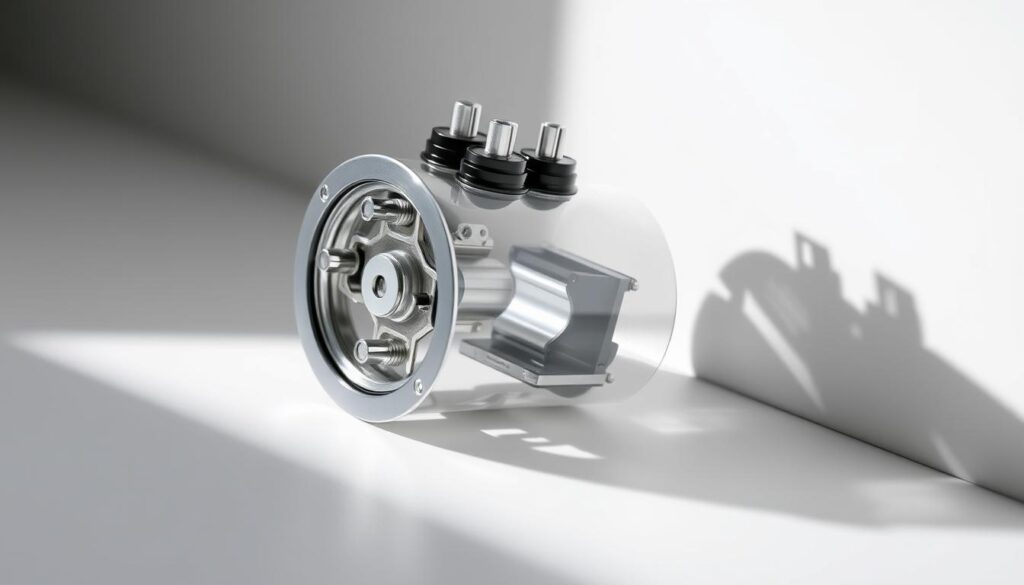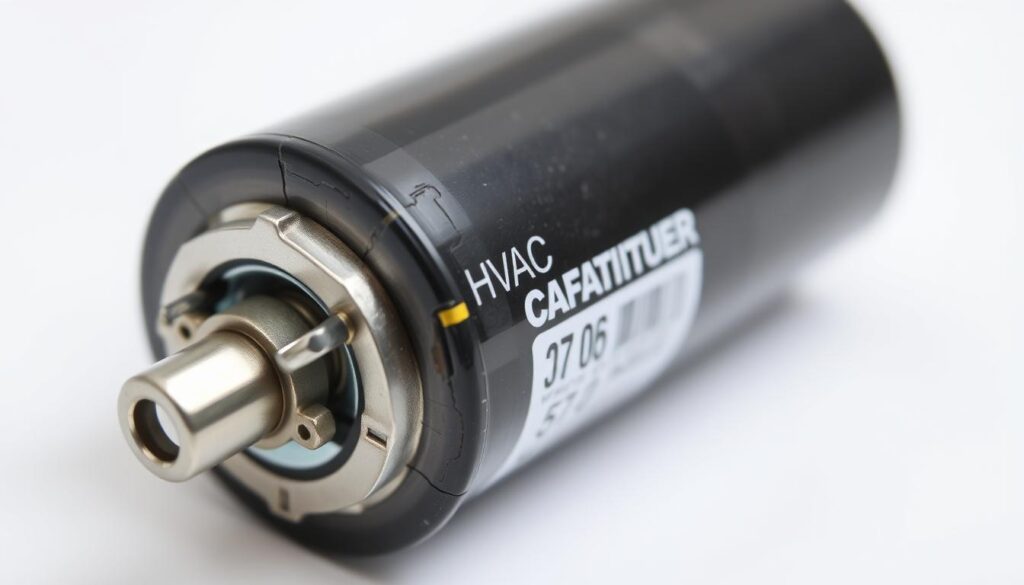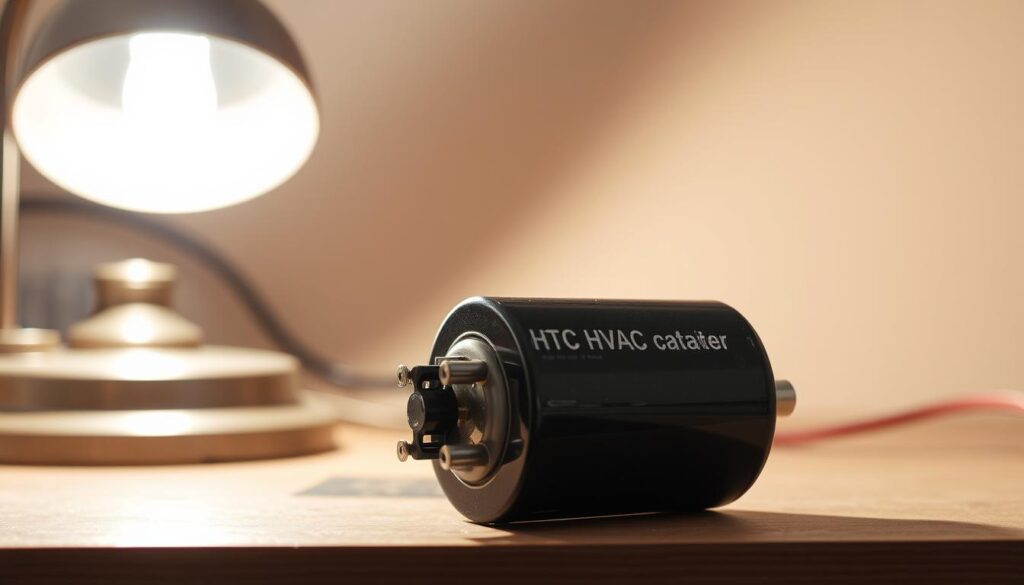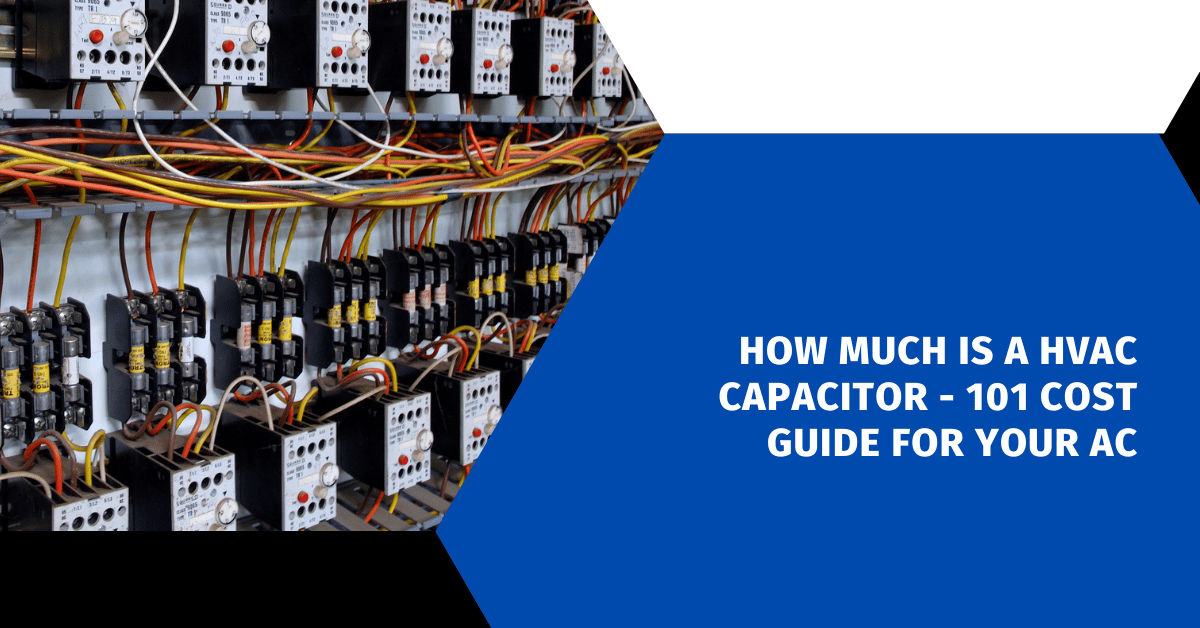Affiliate Disclosure
HVAC Guide Guys is a participant in the Amazon Services LLC Associates Program, an affiliate advertising program designed to provide a means for sites to earn advertising fees by advertising and linking to Amazon.
How Much Is a HVAC Capacitor? Ever wondered what keeps your air conditioner cool on hot days? The HVAC capacitor is small but vital. It helps your cooling system work well.

Knowing the cost of a hvac capacitor can prevent big repair bills. These small parts store and release energy for your AC’s motors. They are key to your system’s smooth operation.
Most people don’t think about their AC’s capacitor until it breaks. Knowing the cost can help you plan for replacements. This keeps your cooling system running efficiently.
Key Takeaways
- Capacitors are essential for AC motor operation
- Replacement costs vary based on capacitor type
- Average lifespan is 10-20 years
- Professional diagnosis can prevent complete system failure
- Regular maintenance helps extend capacitor life
Table of Contents
Understanding HVAC Capacitors and Their Function
Your HVAC system needs capacitors to work right. These small parts are key to keeping your air conditioning running well.
Capacitors give the power needed to start and keep your AC’s motors going. There are different types of capacitors for your cooling system. They help your system work its best and save energy.
Types of HVAC Capacitors
HVAC systems use three main types of capacitors:
- Start Capacitors: Give the first power boost to start the motor
- Run Capacitors: Keep the motor running smoothly while it’s on
- Dual Run Capacitors: Help both the compressor and fan motors
How Capacitors Work in Your AC System
Each capacitor has its own rating for how much energy it can hold. These ratings make sure the right amount of power goes to the motors in your air conditioner.
| Capacitor Type | Primary Function | Typical Voltage Range |
|---|---|---|
| Start Capacitor | Initial Motor Startup | 110-330 Volts |
| Run Capacitor | Continuous Motor Operation | 370-440 Volts |
| Dual Run Capacitor | Compressor and Fan Support | 240-480 Volts |
The Importance of Proper Capacitor Function
If a capacitor doesn’t work right, your AC can have big problems. Choosing the right capacitors and keeping them in good shape is key for cool air and avoiding system failures.
Explore Our HVAC Shop
Looking for top-rated HVAC tools, parts, and accessories? Visit our shop and find the perfect solution for your needs.
Visit the ShopAverage HVAC Capacitor Replacement Costs
Knowing the cost to replace an HVAC capacitor is key for homeowners. The price can range from $80 to $400. This depends on several important factors.
When looking at the cost, consider two main parts:
- Parts Cost: Capacitors are not very expensive, costing between $8 and $45
- Labor Costs: Technicians charge between $60 and $150 per hour
The cost to replace your capacitor will depend on a few things:
- The type of capacitor you need
- Your AC system’s make and model
- Local labor rates
- How complex the installation is
Professional HVAC technicians usually finish the job in 1-2 hours. This keeps the cost down. Even though it might seem pricey, fixing the capacitor quickly can save you from bigger problems later.
Pro tip: Always get multiple quotes from certified HVAC professionals to ensure you’re getting a fair price for your capacitor replacement.
How Much Is a HVAC Capacitor – Price Breakdown by Type
Knowing the cost of HVAC capacitors helps homeowners plan for replacements and upkeep. Capacitors vary in price based on their function and size.
There are three main types of capacitors, each with its own price range:
Start Capacitor Costs
Start capacitors give the first push to start your AC system’s motor. They cost between $9 to $25. Prices depend on:
- Voltage rating
- Microfarad (µF) capacity
- Manufacturing quality
Run Capacitor Pricing
Run capacitors keep the motor running smoothly after it starts. They usually cost between $8 and $30. Prices are influenced by:
- Electrical specifications
- Brand reputation
- Performance rating
Dual Run Capacitor Expenses
Dual run capacitors do both start and run functions in one unit. They are a bit more complex and cost between $15 and $45. Their price reflects:
- Multiple electrical load capabilities
- Compact design
- Advanced technical specifications
“Investing in the right capacitor can prevent costly system failures and improve overall HVAC efficiency.”
| Capacitor Type | Price Range | Key Characteristics |
|---|---|---|
| Start Capacitor | $9 – $25 | Initial motor startup support |
| Run Capacitor | $8 – $30 | Continuous motor operation |
| Dual Run Capacitor | $15 – $45 | Combined start and run functions |
Remember, prices for HVAC capacitors can change based on your system’s needs and local markets. Always get a professional’s advice to find the right capacitor for your HVAC system.
Explore Our HVAC Shop
Looking for top-rated HVAC tools, parts, and accessories? Visit our shop and find the perfect solution for your needs.
Visit the ShopLabor Costs for Capacitor Replacement
When you think about the cost of replacing an HVAC capacitor, labor is a big part. Technicians usually charge between $90 and $200 for this service. The exact price depends on how complex the job is.
Knowing what goes into the labor cost helps homeowners make better choices. HVAC experts look at several things during the replacement:
- How long it takes to find the problem
- Putting in the new capacitor
- Testing and adjusting the system
- Checking the electrical system
The skill of the technician also affects the cost. More experienced technicians might charge more. Where you live also plays a role – cities tend to be pricier than rural areas.
“Professional installation ensures your HVAC system operates safely and efficiently”
While fixing it yourself might save money, hiring a pro is safer. A wrong capacitor can damage your system or be dangerous. Most experts say it’s better to have a pro do it to avoid costly mistakes.
Things that can change labor costs include:
- The technician’s level of certification
- The type of your HVAC system
- How far the technician has to travel
- How busy HVAC services are
Always ask for detailed quotes from different HVAC pros. This way, you’ll know the exact cost for your situation.
Factors Affecting HVAC Capacitor Prices
Knowing what affects hvac capacitor cost helps you choose better for your air conditioning. Prices aren’t random. They depend on many important factors.
Brand and Quality Considerations
Different brands offer different quality levels. High-quality brands cost more because of:
- Superior materials
- Enhanced durability
- Longer warranty periods
- Advanced technological features
Geographic Location Impact
Your location affects hvac capacitor cost. Places with extreme weather have different prices:
| Climate Zone | Average Capacitor Cost | Replacement Frequency |
|---|---|---|
| Southern Hot Regions | $150-$250 | Every 3-5 years |
| Northern Cooler Regions | $100-$200 | Every 5-7 years |
Seasonal Price Variations
HVAC capacitor prices change with the seasons. Prices go up in summer because of more demand. Buying in off-peak seasons can save you money.
“Smart homeowners understand that timing can be just as important as the product itself when managing HVAC expenses.” – HVAC Professional Insight
Signs of a Failing Capacitor
Spotting hvac capacitor failure early can prevent expensive AC system repairs. Your air conditioning unit sends out warning signs of capacitor trouble. Homeowners should pay close attention to these signals.

Understanding the signs of capacitor failure is key to troubleshooting. Here are the main indicators that your AC capacitor might be failing:
- Delayed AC startup or difficulty turning on
- Intermittent cooling performance
- Unexpected system shutdowns
- Unusual humming or buzzing sounds from the outdoor unit
- Noticeable increase in energy consumption
Some symptoms are urgent and need quick action. A burning smell near your outdoor unit or visible smoke means a serious capacitor problem. It needs a professional check right away. These signs show your capacitor is having trouble keeping the right electrical flow to your AC system.
| Symptom | Potential Capacitor Problem | Recommended Action |
|---|---|---|
| Slow AC Startup | Weakening Capacitor Charge | Professional Diagnostic Check |
| Intermittent Cooling | Inconsistent Electrical Supply | Capacitor Replacement |
| Unusual Noises | Electrical Component Strain | Immediate Professional Evaluation |
Spotting these signs early can stop a full system breakdown. If you see several symptoms, call an HVAC expert. They can check your capacitor and replace it if needed.
Explore Our HVAC Shop
Looking for top-rated HVAC tools, parts, and accessories? Visit our shop and find the perfect solution for your needs.
Visit the ShopProfessional vs DIY Replacement Considerations
Homeowners often wonder if they should replace their HVAC capacitor themselves or hire a pro. The choice affects how well your system works and your safety.
Replacing an HVAC capacitor is not easy. HVAC technicians get special training to work with complex electrical parts safely.
Safety Concerns
Electrical systems can be dangerous for those who don’t know how to handle them. HVAC capacitors hold electrical charge even when the system is off. This can be risky:
- Risk of electrical shock
- Potential for serious injury
- Damage to expensive HVAC equipment
Required Tools and Skills
Replacing an HVAC capacitor needs special tools and knowledge. You need:
- Precise voltage testing equipment
- Understanding of electrical circuits
- Proper safety protective gear
- Specific capacitor matching skills
Warranty Implications
DIY repairs can void your system’s warranty. Most manufacturers require certified professional installation to keep the warranty valid. Professional service might cost more upfront, but it can save you money in the long run.
While hiring a pro might seem expensive at first, it’s worth it. It can prevent system damage and save you money in the long run.
Cost-Saving Tips for Capacitor Replacement
Keeping your HVAC capacitor costs down doesn’t have to be expensive. Smart homeowners can save money by planning ahead and taking care of their systems. Knowing how to cut down on replacement costs can lead to big savings over time.
Here are some ways to lower your HVAC capacitor replacement costs:
- Purchase the capacitor independently and hire a technician for installation
- Learn to recognize early warning signs of capacitor failure
- Schedule AC maintenance during off-peak seasons
- Perform regular HVAC system cleaning and inspection
The best way to handle HVAC capacitor costs is through regular maintenance. Catching problems early can prevent costly emergency fixes.
| Maintenance Strategy | Potential Cost Savings |
|---|---|
| Annual Professional Inspection | Up to 40% reduction in repair costs |
| DIY Basic Cleaning | $50-$100 saved per service |
| Off-Season Maintenance | 15-25% lower service rates |
Learning about your AC system can save you a lot of money. Knowledge is power when it comes to managing HVAC maintenance costs.
Pro Tip: Regular maintenance is always cheaper than emergency replacements.
By using these cost-saving tips, you can manage your HVAC capacitor expenses well. This ensures your system works its best.
Explore Our HVAC Shop
Looking for top-rated HVAC tools, parts, and accessories? Visit our shop and find the perfect solution for your needs.
Visit the ShopCapacitor Maintenance and Longevity
Keeping your HVAC system’s capacitor in good shape is key to its performance. Most capacitors can last up to 20 years. But, with the right care, they can last even longer and keep your air conditioning working well.

Regular maintenance is vital to avoid early capacitor failure. Here are important steps to make your capacitor last longer:
- Schedule annual professional HVAC inspections
- Keep your AC unit clean and free from debris
- Ensure proper electrical connections
- Monitor system performance regularly
Different capacitors have different lifespans and needs. Knowing these can help you spot problems early and avoid expensive fixes.
| Capacitor Type | Average Lifespan | Maintenance Recommendations |
|---|---|---|
| Start Capacitor | 10-15 years | Check for signs of wear annually |
| Run Capacitor | 15-20 years | Professional electrical testing every 2-3 years |
| Dual Run Capacitor | 12-18 years | Regular system performance monitoring |
“Preventative maintenance is always more cost-effective than emergency replacements.” – HVAC Professional Advice
Pro tip: Watch for signs like irregular system cycling, unusual humming sounds, or decreased cooling efficiency. These could mean capacitor problems before they fail completely.
When to Replace Your AC Capacitor
Your air conditioning system needs capacitors to work well. Knowing when to replace them can avoid big problems and expensive fixes in the summer.
Spotting warning signs is key to HVAC capacitor troubleshooting. Replacing them early can stop bigger issues and keep your cooling running smoothly.
Age-Related Factors
Capacitors usually last 5-7 years. Look out for these age-related signs:
- System age over 5 years
- Frequent AC cycling
- Increased electrical consumption
- Inconsistent cooling performance
Performance Indicators
Keep an eye out for these performance signs:
- Humming sounds from the AC unit
- Delayed system startup
- Intermittent cooling
- Unexpected system shutdowns
Emergency vs Planned Replacement
Knowing when to replace your capacitor can save money. It’s about planned maintenance versus sudden repairs.
| Replacement Type | Characteristics | Cost Impact |
|---|---|---|
| Planned Replacement | Proactive maintenance | Lower cost, predictable |
| Emergency Replacement | Sudden system failure | Higher cost, urgent repair |
Pro tip: Regular professional inspections can help you transition from emergency to planned replacements, ultimately saving money and preventing unexpected breakdowns.
Explore Our HVAC Shop
Looking for top-rated HVAC tools, parts, and accessories? Visit our shop and find the perfect solution for your needs.
Visit the ShopCommon Capacitor Brands and Their Costs
When looking for an HVAC capacitor, knowing the prices and brands is key. Capacitor prices vary a lot between different makers. Each brand has its own benefits.
Many well-known brands lead the HVAC capacitor market:
- Carrier – Known for premium quality and reliability
- Lennox – Offers high-performance capacitors with advanced technology
- Trane – Provides durable capacitors with consistent performance
- Goodman – Delivers budget-friendly options with solid reliability
The cost of your hvac capacitor depends on a few things:
- Brand reputation
- Capacitor specifications
- Material quality
- Performance ratings
“Not all capacitors are created equal. Investing in a quality brand can save you money in the long run.” – HVAC Professional
Prices for capacitors range from $10 to $50 for budget options. Premium brands can cost between $50 and $100. Top brands often mean better performance and longer life, saving money over time.
When picking a capacitor, think about your HVAC system’s needs. Talk to a pro to make sure it fits right and works well.
Conclusion
Knowing how much a HVAC capacitor costs helps you make better choices for your air conditioning. Replacing a capacitor can cost between $150 and $300. This price depends on the brand, quality, and where you live.
A failing capacitor can lead to more costly repairs if not fixed quickly. By spotting the signs early and acting fast, you can avoid bigger problems later.
Your HVAC system works best when the capacitor is in good shape. Even though replacing it might seem expensive, it’s a smart investment. It keeps your home comfortable and saves energy.
Regular maintenance and timely replacements can make your air conditioner last longer. This helps you avoid sudden breakdowns when it’s hottest outside.
Planning ahead for a capacitor replacement can save you money and worry. You can choose to have a pro do it or try it yourself. Always put safety and quality first.
Knowing about your AC system’s parts and upkeep is important. This way, you can keep your cooling reliable and cut down on repair costs over time.
Looking after your HVAC system is essential. Talk to local HVAC experts for accurate prices and advice. They can help based on your equipment and local weather.

